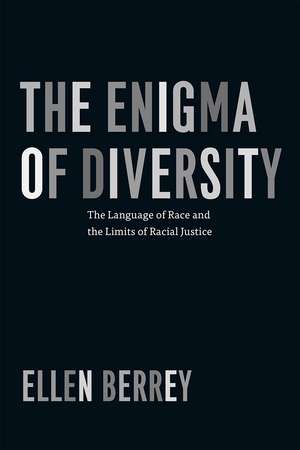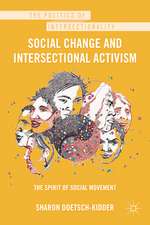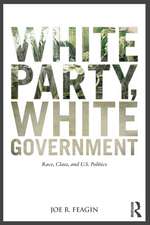The Enigma of Diversity: The Language of Race and the Limits of Racial Justice
Autor Ellen Berreyen Limba Engleză Paperback – 18 mai 2015
Diversity these days is a hallowed American value, widely shared and honored. That’s a remarkable change from the Civil Rights era—but does this public commitment to diversity constitute a civil rights victory? What does diversity mean in contemporary America, and what are the effects of efforts to support it?
Ellen Berrey digs deep into those questions in The Enigma of Diversity. Drawing on six years of fieldwork and historical sources dating back to the 1950s and making extensive use of three case studies from widely varying arenas—housing redevelopment in Chicago’s Rogers Park neighborhood, affirmative action in the University of Michigan’s admissions program, and the workings of the human resources department at a Fortune 500 company—Berrey explores the complicated, contradictory, and even troubling meanings and uses of diversity as it is invoked by different groups for different, often symbolic ends. In each case, diversity affirms inclusiveness, especially in the most coveted jobs and colleges, yet it resists fundamental change in the practices and cultures that are the foundation of social inequality. Berrey shows how this has led racial progress itself to be reimagined, transformed from a legal fight for fundamental rights to a celebration of the competitive advantages afforded by cultural differences.
Powerfully argued and surprising in its conclusions, The Enigma of Diversity reveals the true cost of the public embrace of diversity: the taming of demands for racial justice.
Ellen Berrey digs deep into those questions in The Enigma of Diversity. Drawing on six years of fieldwork and historical sources dating back to the 1950s and making extensive use of three case studies from widely varying arenas—housing redevelopment in Chicago’s Rogers Park neighborhood, affirmative action in the University of Michigan’s admissions program, and the workings of the human resources department at a Fortune 500 company—Berrey explores the complicated, contradictory, and even troubling meanings and uses of diversity as it is invoked by different groups for different, often symbolic ends. In each case, diversity affirms inclusiveness, especially in the most coveted jobs and colleges, yet it resists fundamental change in the practices and cultures that are the foundation of social inequality. Berrey shows how this has led racial progress itself to be reimagined, transformed from a legal fight for fundamental rights to a celebration of the competitive advantages afforded by cultural differences.
Powerfully argued and surprising in its conclusions, The Enigma of Diversity reveals the true cost of the public embrace of diversity: the taming of demands for racial justice.
Preț: 242.54 lei
Nou
Puncte Express: 364
Preț estimativ în valută:
46.41€ • 50.62$ • 39.13£
46.41€ • 50.62$ • 39.13£
Carte tipărită la comandă
Livrare economică 24 aprilie-08 mai
Preluare comenzi: 021 569.72.76
Specificații
ISBN-13: 9780226246239
ISBN-10: 022624623X
Pagini: 352
Ilustrații: 6 halftones, 1 map, 2 line drawings, 3 tables
Dimensiuni: 152 x 229 x 33 mm
Greutate: 0.5 kg
Ediția:1
Editura: University of Chicago Press
Colecția University of Chicago Press
ISBN-10: 022624623X
Pagini: 352
Ilustrații: 6 halftones, 1 map, 2 line drawings, 3 tables
Dimensiuni: 152 x 229 x 33 mm
Greutate: 0.5 kg
Ediția:1
Editura: University of Chicago Press
Colecția University of Chicago Press
Notă biografică
Ellen Berrey assistant professor of sociology at the University of Toronto, and an affiliated scholar of the American Bar Foundation.
Cuprins
Introduction
One The Symbolic Politics of Racial Progress
Part I: Undergraduate Admissions at the University of Michigan
Two “Academically Excellent and Diverse”
Three Gratz, Grutter, and the Public Relations of Defending Affirmative Action
Part II: Housing Politics in Rogers Park
Four “The Most Diverse Neighborhood in Chicago”
Five Gentrification, Displacement, and the Color-Blind Opposition to Subsidized Housing
Part III: Human Resource Management in Starr Corporation
Six “Diversity Is a Strength of Starr Corporation”
Seven Diversity Management, Shareholder Capitalism, and the Biases of Meritocracy
Conclusion: Neoliberalism, Color Blindness, and Inequality in the Age of Diversity
Acknowledgments
Methodological Appendix
Notes
References
Index
One The Symbolic Politics of Racial Progress
Part I: Undergraduate Admissions at the University of Michigan
Two “Academically Excellent and Diverse”
Three Gratz, Grutter, and the Public Relations of Defending Affirmative Action
Part II: Housing Politics in Rogers Park
Four “The Most Diverse Neighborhood in Chicago”
Five Gentrification, Displacement, and the Color-Blind Opposition to Subsidized Housing
Part III: Human Resource Management in Starr Corporation
Six “Diversity Is a Strength of Starr Corporation”
Seven Diversity Management, Shareholder Capitalism, and the Biases of Meritocracy
Conclusion: Neoliberalism, Color Blindness, and Inequality in the Age of Diversity
Acknowledgments
Methodological Appendix
Notes
References
Index
Recenzii
“From the language of Supreme Court opinions to conversations held in private and public, we have disconnected the idea of ‘diversity’ from our nation’s history of slavery and racial discrimination and obscured its profound importance to American society. In her in-depth study, Berrey explains the urgency of rejecting this distortion. Her investigation of the term, who employs it, and to what end underscores the need for uninhibited discourse about racial hierarchies and inequality. Berrey adds a vibrant, vital, and incisive voice to the discussion.”
"Smart and subtle."
“The Enigma of Diversity’s most important contribution is to carefully trace the symbolic politics of racial progress produced by specific decisions made in organizational settings in higher education, urban development and the corporate world. Berrey’s keen eye dissects how various meanings of diversity offered by competing actors have led to the current racial order. Her compelling analysis sheds new light on processes of transformation of group boundaries, the destigmatization of African-Americans, and the limits of the diversity paradigm for a genuine transformation of racial inequality in American society. Her book is an important addition to the literature on the production of racial and class inequality.”
"In this important book Berrey shows how the demands for inclusion of the racially oppressed during the Civil Rights Era were translated in universities, communities, and corporations into practices to keep the powerful in control. Berrey has deconstructed the symbolic politics of diversity and helped us understand the fundamental importance of substantive rather than formal diversity."
“While others have bemoaned the conceptual shortcomings of diversity talk in universities and the workplace, Berrey makes a remarkable contribution in providing a series of stunning empirical examples of precisely how and why this rhetoric—with all of its good intentions—can limit substantive pursuits of equality, reaffirm status quo market orderings, and further entrench racial hierarchies. This insightful study cautions readers to think twice before uncritically embracing the language and politics of diversity and offers a much needed empirical basis for shifting the discourse of equality from the thin individualist aesthetics of identity distribution to much more robust group-oriented pursuits of justice, accountability, and inclusion.”
“Drawing on the extensive case analyses, and embedding herself in core theoretical questions surrounding culture, power and diversity, Berrey provides an important snapshot of historical and contemporary claims-making about inequality and institutional practices in higher education, housing and work. Fascinating and important in these regards is Berrey's simultaneous attention to the hopes but also pitfalls of current diversity efforts—efforts that are forged in an arena of definitional ambiguity, sometimes clarified through the courts, and filtered through popular and media perceptions. This is a must read for culture, diversity and organizational scholars, as well for practitioners and those with specific interests in education, work, housing and inequality.”
“This is a wonderful book. It makes important contributions to cultural analysis, organizational change, social movements, and race and ethnic relations. The in-depth, insightful, balanced, and theoretically grounded ethnography of the corporation is especially valuable. Berrey’s close-up examination of how it looks on the ground, and the variety of cross-pressures affecting the implementation of these policies, is worth the price of the book alone. Berrey writes as a sympathetic observer, with an agenda of understanding, rather than as an advocate of diversity policies or a close-minded critic.”
“An impressive achievement.”
“Berrey suggests a method of considering diversity that diverges considerably from the paradigm adopted by the authors of public policy, positioning ‘diversity’ as a broader concern than has been previously defined. . . . Berrey teases out themes of neoliberalism as a paradigm and color blindness as a policy and argues that comparing color blindness with the real objectives of diversity clearly shows the ‘symbolic politics of racial progress.’ Recommended.”
“The Enigma of Diversity is a strong contribution to the literature on diversity, providing a complex and nuanced view of how the language of diversity functions in different areas. . . . Berrey has pushed the diversity conversation forward substantially and identified areas from which future researchers can build toward a fuller understanding of the enigma of diversity.”
“The Enigma of Diversity is a major contribution to the study of race. Berrey’s multicase design compellingly demonstrates how deeply the language of diversity has permeated racial politics and the significant consequences this has had. The book will shape future debates about racial inequality in education, employment, and housing. It will also encourage further scholarship on the diversity discourse, as well as the role of language and discourse in racial politics more broadly. Any scholar working on these issues will want to read this book.”
“In The Enigma of Diversity, Berrey looks beyond diversity rhetoric that offers illusions of openness and progress to the actual practices that organizations use to demonstrate their commitments to diversity. . . . She convincingly argues that it is important to interrogate the causes and consequences of this valorization of diversity by focusing on the organizational practices that have largely escaped scrutiny. Berrey invites more nuanced discussions that focus on the relationship between diversity and the actual distribution of access and opportunity to mobility-enhancing resources.”
“Berrey’s is a crucial study of the way that expressions of multiculturalism and demonstrations of inclusivity have supplanted attention to organizational practices and cultures that are tied to ongoing inequality. The book examines the American orientation to diversity in a college, a company, and a neighborhood.”
"Ellen Berrey presents a comprehensive and insightful analysis of the rhetorical and doctrinal limits of diversity. The aspirational features of diversity, particularly inclusion, are laudable goals for any societal institution, but diversity never really eradicates racial hierarchies or the permanence of structural inequality. . . . . Berrey’s work is a valuable addition to the literature for political scientists, sociologists, and constitutional law scholars."
"Berrey deftly demonstrates how contemporary definitions of diversity have resulted in civil rights-era claims for racial justice being replaced with despairing, tokenistic institutional practices that invest more in diversity as symbol than as a meaningful catalyst for creating greater inclusion. . . . In a macro sense, Berrey has perhaps produced a quintessential exploration of the counterintuitive effects that may result when fluid ideological meanings combine with brittle organizational practice. More narrowly, her insightful observations across time, location, and context have uncovered how malleable, 'feel good' definitions of diversity become the apparatus for frustrating opportunities for real racial progress."













